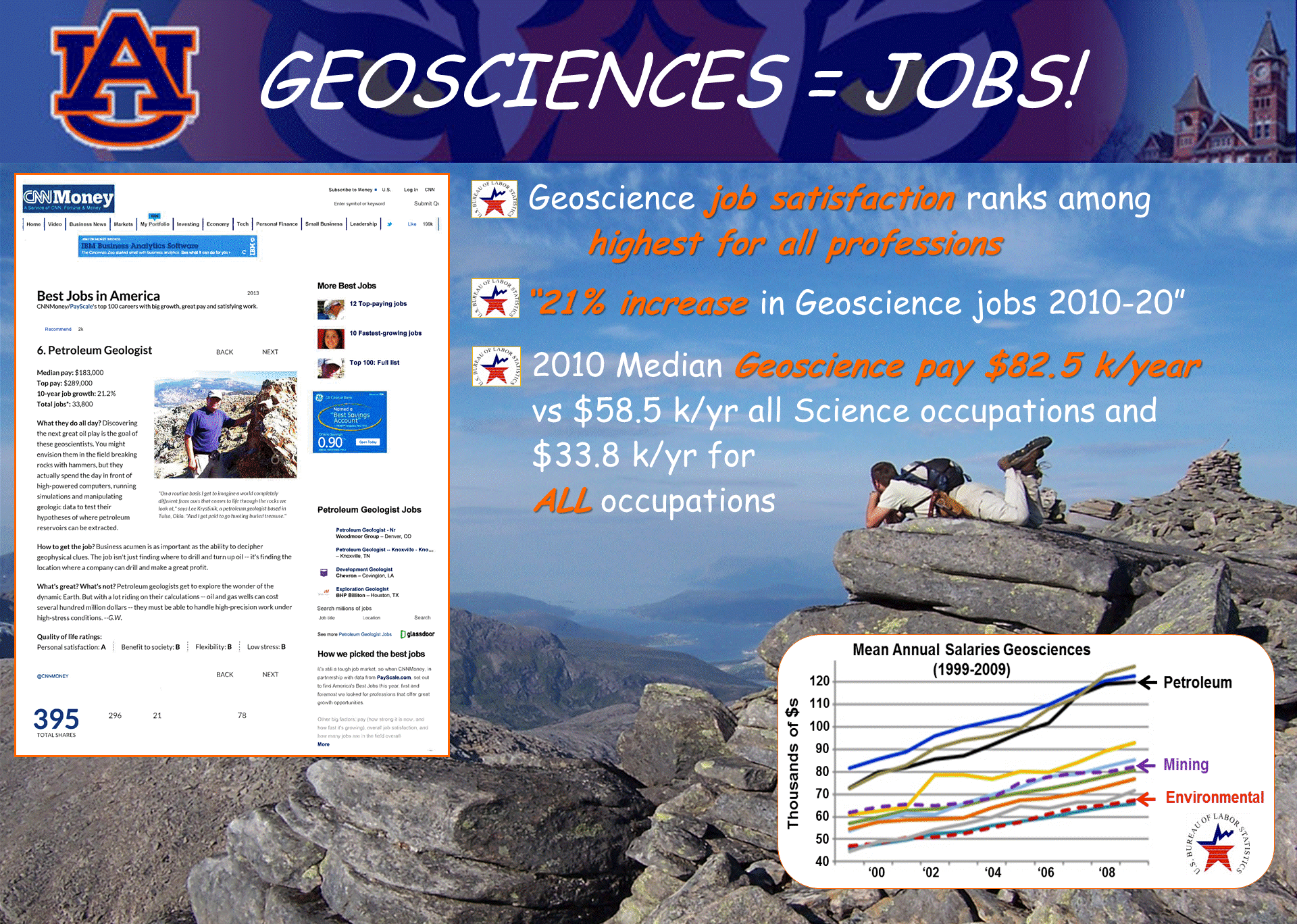Careers in the Geosciences
Department of Geosciences
The Geosciences include studies of Earth's composition, structure, and the spatial and temporal analysis of physical and human systems. A geoscientist emphasizing geology might gain employment in fields related to the search for natural resources such as groundwater, metals and petroleum, or assist in efforts related to environmental preservation and stewardship. A geoscientist emphasizing geography might gain employment in urban and regional planning, environmental consulting, geospatial analysis, and field surveying. The increase in the demand and use of geospatial technologies, including Remote Sensing, Geographic Information Systems, and Global Positioning Systems, also makes knowledge in the application of these tools and techniques essential to a geoscientist’s career. Geoscientists, find employment at multiple scales, local to global, and may divide their time between the laboratory, office, and the field, often requiring written and/or oral reports on completed projects.
Geoscientists’ salary (http://www.bls.gov/ooh/life-physical-and-social-science/geoscientists.htm)
The U.S. Bureau of Labor Statistics predicts that job growth for geoscientists will be faster than the average for all occupations through 2022. In 2012, Geoscientists earned a median annual salary of $90,890 and median hourly wages of $43.70. ( http://www.bls.gov/ooh/life-physical-and-social-science/geoscientists.htm)

Places of employment
More than 38,000 geoscientists were employed in the United States in 2012. Geoscientists work for industry, governmental agencies, educational institutions, and non-profit organizations. The following are examples of employers.
Industry --Petroleum companies, mining companies, engineering and environmental consulting firms, and independent research laboratories.
Government agencies --Local, state, and federal agencies such as the U.S. Geological Survey, Environmental Protection Agency, Bureau of Land Management, Army Corps of Engineers, state water control boards, and state geological surveys.
Educational institutions --Secondary schools, colleges, universities, and museums.
Non-Profit Organizations --Local, state, and federal organizations.
Additional career information for geoscientists can be found at following sites:
Bureau of Labor Statistics Geoscientists Summary (http://www.bls.gov/ooh/Life-Physical-and-Social-Science/Geoscientists.htm)
Bureau of Labor Statistics Mining and Geological Engineers ( http://www.bls.gov/ooh/architecture-and-engineering/mining-and-geological-engineers.htm)
What is the economic impact of Geo services?, Oxera Consulting, Inc. 2013: ( http://www.oxera.com/oxera/media/oxera/downloads/reports/what-is-the-economic-impact-of-geo-services_1.pdf)
View the United States Geological Survey’s (USGS) video on Earth Science careers in the geosciences: ( http://gallery.usgs.gov/videos/327#.Va3UmbWRaT0)
Search Jobs in Geology:
AGI Guide to Geoscience Careers and Employers (http://guide.agiweb.org/employer/index.html)
Geology Jobs ( http://geology.com/jobs.htm)
Geology Online: 105 Websites That Rock ( http://geologydegree.org/sites-that-rock/)
Search Jobs in Geography:
Geography Jobs and Careers http://www.aag.org/careers
Geography Jobs http://geography.about.com/od/careersingeography/a/jobsgeography.htm
https://www.datascienceprograms.org/degree/masters/gis
http://www.gislounge.com/building-a-career-in-gis/
http://www.bls.gov/oes/current/oes193092.htm
http://www.bls.gov/ooh/architecture-and-engineering/cartographers-and-photogrammetrists.htm
http://www.bls.gov/oes/current/oes192042.htm
http://www.mastersindatascience.org/specialties/geospatial-science/
https://www.cdc.gov/women/stem/
https://www.discoverdatascience.org/related-programs/gis/
Degree Requirements:
Although each job requires a different geosciences background and level of education, the minimum requirement is either a Bachelor of Science (B.S.) or Bachelor of Arts (B.A.) degree. Many jobs also require a graduate-level degree, either a Master of Science (M.S.) or a Doctor of Philosophy (Ph.D.).